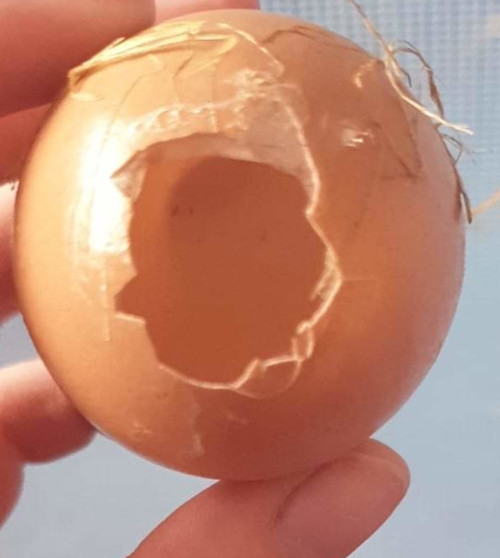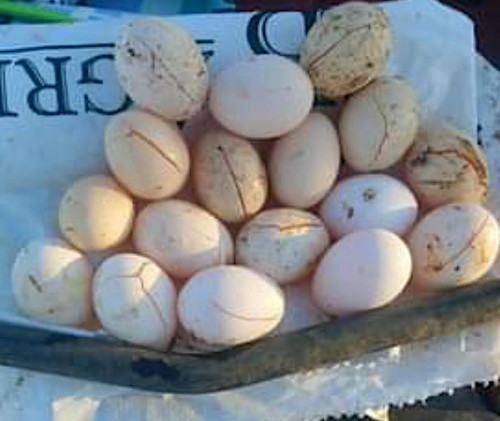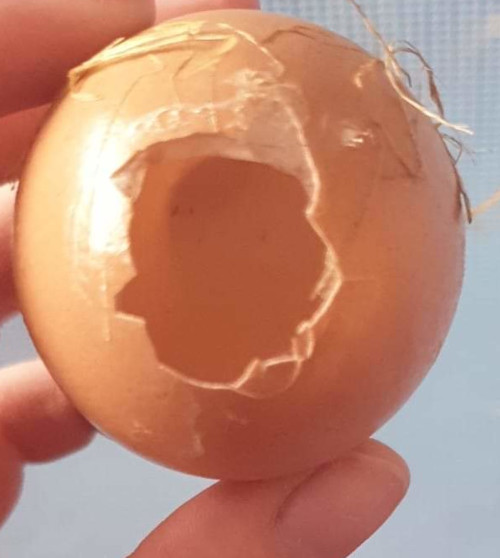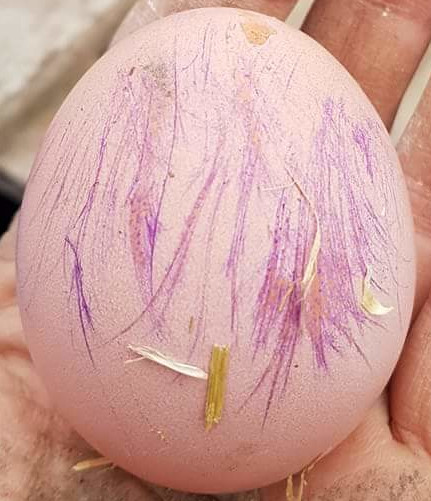The surprising reasons chickens eat their own eggs and 9 ways to deal with it.

Finding a broken egg in a nest box can be heartbreaking for the chicken keeper as once the habit has started it tends to spread among the flock and become progressively more difficult to deal with..
Table of Contents
Why do chickens eat their own eggs?
Chickens eat their own eggs because they are hungry, short of minerals, bored or an egg got broken by accident. Eggs that crack open when frozen may start the habit.
A calcium deficiency is not the most common reason as people think as the shells are almost always intact with just a hole in one side.
| Reason | How to Stop |
|---|---|
| Nutritional deficiency | Provide a balanced diet that is high in protein and calcium. |
| Boredom | Provide plenty of enrichment activities, such as toys and scratching areas. |
| Crowding | Provide enough space for each chicken to have its own nesting box. |
| Egg breakage | Collect eggs frequently and clean up any broken eggs immediately. |
| Learned behaviour | Remove any eggs that have been eaten and break them up so that the other chickens cannot see them. |
| Weak eggshells | Provide a source of calcium, such as oyster shells or crushed eggshells. |
| Stress | Reduce stress in the chicken coop by providing a quiet, safe environment. |
Chickens that are stressed may start eating their own eggs as a coping mechanism. Stress can be caused by several factors, including overcrowding, predators, and changes in their environment.
Below: I had over 60 images of egg that had been eaten by chickens and in not one case had the chicken eaten the shell. They all just had holes pecked in them.

To some extent the behaviour is natural as chickens will clean up a nest after the chicks have hatched by eating the shells.
To prevent chickens from getting bored and pecking at their eggs, provide them with plenty of entertainment. You can provide them with toys, perches, and access to the outdoors.
How does egg eating start?
Egg eating normally starts when a hen breaks a thin shelled egg in the nest although an over full nest can cause the same problem. The hen discovers that eggs are easy to eat, nutritious and in plentiful supply.
Once she has had one egg, the hen will start on another and others may join in, leading to a problem.
Below: Egg that crack when frozen can easily start the habit.

Take care not to drop eggs while you are collecting them from the boxes as the hens will tuck into the egg before you can do anything about it.
How do you stop hens eating their eggs?
Egg eating is a distressing habit found mostly in younger pullets but can occur in older hens and very rarely with roosters. It is a relatively rare problem is free range birds and is a little more common in confined ones.
- Keep your chickens well fed.
- Provide shell and grit to keep the egg shells at their best.
- Make sure the protein level in the feed is around 16%.
- Add wooden, pottery or dummy eggs to the nest.
- Collect your eggs more often.
- Use fresh feed. Stale food can lose nutritional value.
- Allow them to free range.
- Keep nests dark.
- Use slanted or roll away nesting boxes.
- Never feed your chickens eggs in the shell.
- Never let them start. It is easier to prevent.
The big problem is the underlying issues are often not addressed until the problem manifests itself and with many of these things prevention is always better than cure.
Firstly, before accusing any of your hens it is a good idea to make sure it is definitely hens eating the eggs, Mink, Rats, crows and magpies all eat chicken eggs and all have been known to steal them from coops.
As I live in Yorkshire and we don’t get raccoons I have never had to deal with one but I suspect they too are opportunistic egg thieves. You could spend ages trying to stop the hens eating the eggs when it’s not even them doing the damage.
Below: An egg eaten by a chicken. They will eat the yolk first.

Although many people think egg eating is impossible to break, and to just cull the hen, in many cases this is not true.
Egg eating often starts when an egg is accidentally broken in the nest box, and the hen pecks at it.
Preventing hens from eating their own eggs?
Chickens break and eat their own eggs by accident for the first time. Overcrowding, feed deficiencies and mineral shortages are the most common reasons chickens start eating their own eggs. And it's easy source of food for a lazy hen.
Finding that this weird yellow substance is tasty, they will quickly devour it, and when they lay their next egg look for more. Other hens that catch the original one doing this habit may even join in and you’ll end up with a whole flock of egg eaters.
Prevention is always better than a cure - of course the easiest way to stop eggs from being eaten is to prevent egg eating in the first place. There are several ways to ensure this.
Below: Soft shelled eggs are easily eaten by chickens.
Make sure they have plenty of oyster shell and other protein. This will help them have strong healthy shells which will prevent eggs from being accidentally broken.
Check the amount of nesting material. Make sure they have plenty of soft bedding to prevent eggs from being broken while the hens settle on the nest ready to lay.
Collect regularly - remove the eggs as soon as they have been laid rather than leaving them in the nest until the evening.
Use roll away nest boxes. These collect the eggs away from the eyes and beaks of the chickens so they never get the chance.
Don’t let your hens go hungry!
Don't let your flock get bored either. This makes them more likely to go hunting for things to amuse themselves with and start pecking at the eggs. Give them food bits, and treats to scratch around for. Try making ‘apples on a stick’, or hang cabbages for them to peck at (instead of the eggs!).
This is a good reason to free range your birds, if they are out and about they are less likely to be in the nest boxes unless they are actually laying.
Do chickens naturally eat their own eggs?
Chickens do not naturally eat their own eggs. Chickens will eat anything that looks like food and will eat a broken egg very quickly given the chance. Once a hen has tasted fresh eggs and found out how good they are she may be forever an egg eater may start breaking eggs intentionally in order to eat them.
Egg eating is a habit that has to start somewhere. Egg eating begins when:
- Chickens go hungry and there are eggs in the nest.
- Nests are left to get too full.
- An egg gets broken and the birds eat it.
- Someone is laying soft shelled or shell less eggs.
- Hens are bored or locked in the coop.
Some hens naturally consume the shells in a nest after chicks have hatched.
The egg eating habit can spread among your flock.
How do you catch the egg eater?
So you have an egg eater. Next thing to do is find the culprit! There is always a solution. Most hens will eat an egg at some point, if you have big ladies like we do and they squash an egg they will generally eat it.
First of all you can inspect each hen. Do any of them have egg on their face? Or underside where they have broken the egg underneath. Wetness? If you find no evidence, of course, you can always watch the nest boxes to find the culprit. However, there are many easier ways to do this.
Below: An egg with some purple colouring to identify which hen laid it. Identifying which hen laid an egg might help find the culprit.

One way is to blow out the egg, and add some food colouring. This way you can break and find your egg eater at the same time. Just look for the hen with colouring on her face!
Other methods of catching egg eating chickens are:
- Placing an egg on the ground and seeing who goes for it.
- Game camera's set up to record the nests.
- Isolating each hen.
- Food colouring.
9 Ways to break the egg eating habit:
It’s very important to break this as soon as possible as it can spread. Below are a few helpful tips to breaking your egg eater, starting with the easiest solutions.
1. Hang ‘curtains’ around the nesting box to make it a little darker, something like flap of old jeans material or a piece of sacking. The chickens won’t be able to peck at the eggs if they can’t see them.
2. Place golf balls, or some sort of false egg or rounded river pebbles, in the nesting box. When using this method, make sure you gather the eggs just after they’re laid, so that you can further discourage egg eating. After a while, your hens will get tired of pecking at plastic, pottery eggs or stones and getting a sore beak, and hopefully the habit will fade.
3. Make sure they have food available. If they are regularly going hungry they will go looking for food.
Nutrients, if chickens are missing grit or calcium in their diet they may eat eggs. Chickens need a supply of small stones and grit to keep them healthy, you can recycle their own shells back to them after roasting them for a few minutes and crushing them into small pieces or buying grit to add to their feed.
Diatomaceous earth makes a good food additive for providing trace elements and minerals into the diet, I feed it once a week by adding a few drops of olive oil to the grain and adding 1 teaspoon per bird and mixing well so as the powder coats the grain. Thin shelled eggs or eggs with missing shells are a good indication of calcium shortage. Access to freshly turned earth is also a good idea.
If they need a few extra calories give some sunflower seeds or a handful of suet pellets of the same type they give garden birds.
4. Give your chickens more protein and / or calcium. Yes, it may be as simple as that. Eggs are high in protein, and some chickens, when they are not getting enough, will go as far as eating eggs. Some things to give that are high in protein include Turkey ration or growers pellets. Also mashed up boiled or scrambled eggs, don’t worry they won’t associate cooked with raw egg.
5. Take all the straw or nesting material out of the nesting box. This way, the hen will peck at the egg and it will roll away from her. It might seem a rather odd idea, but it’s had its moments. It’s not easy for a hen to break through an eggshell. This one seems a little counter intuitive to me and I have never tried it but let me know if it works for you.
6. Incline the nest box so the egg rolls to the back of the box with a flap to cover the eggs. The next stage up from this is to have a custom built nest box where the eggs rolls into an egg collector underneath the box itself. You can buy custom inserts for nesting boxes.
7. This is the supposedly a commonly used method among backyard chicken keepers, poke a small hole in each end of the egg and then blow on one end, until the egg is empty. Fill up the egg with mustard, or dish-soap. Then place it in the nesting box. Chickens hate the taste of mustard, and once they peck into that, they may not be trying it again. It may take a couple tries using this method, just in case it doesn’t work the first time. I have never used this method so this is purely hearsay.
8. Pin-less peepers. These are a sort of ‘blinder’ that prevents chickens from pecking at each other. It makes it so that they cannot see in front of themselves, only off to the sides. However this can also be used to break egg eaters. It works in a similar way as darkening the nesting box- the hens won’t be able to peck straight at the egg. Leave these on awhile and the habit will probably be broken. Again I have never used this method but some swear by it.
9. Roll away nest boxes - Unfortunately some egg eaters are just impossible to break. There is a solution to this, though, other than the cooking pot. You can get a special kind of roll out nest box. This way the eggs will roll out of the hens reach as soon as she lays them. These nest boxes are the kind that battery hen farms use (don’t worry, they are completely humane), and are extremely effective in stopping your egg eater.
I hope you find this helpful if you have an egg eater and successfully break, or prevent, the habit.
